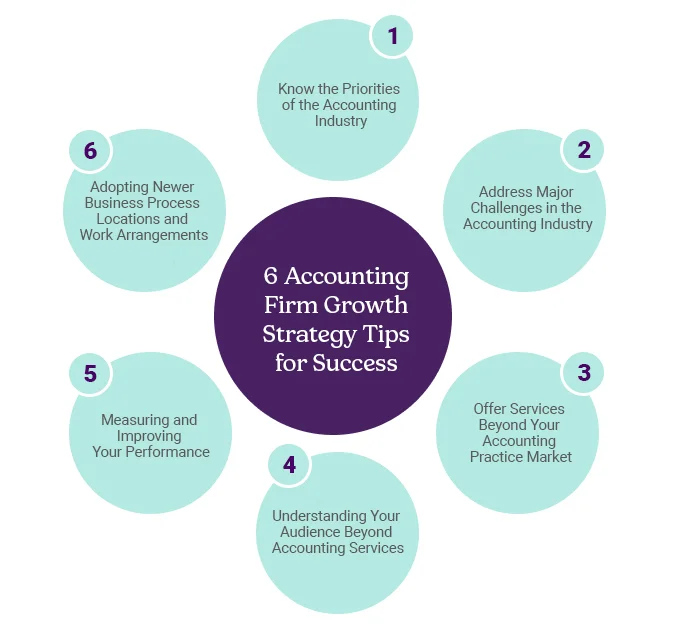When it comes to growing their businesses, accounting firms usually take cues from the four global leaders in accounting.
Let’s look at industry giant Deloitte for example: they’ve expanded drastically over the last years — tapping into more markets, getting more experts on board, and forging strategic partnerships with other businesses as well.
As you may already know, these are growth strategies that are carried out to boost sales, increase market dominance, and develop business resilience amidst the ever-changing accounting landscape.
After all, a solid growth strategy doesn’t just keep accounting firms out of the red; it helps them increase their competitive advantage, achieve long-term success, and solidify a good reputation beyond the industry.
So, for owners aiming to build high growth firms, look no further — here’s our list of actionable tips, insights, and strategies to help you with your business goals.
1) Know the Priorities of the Accounting Industry

Accounting firms primarily invest in technology upgrades.
Most would agree that accounting involves grueling work, which is why it’s ideal for accounting firms to streamline their processes and improve their efficiency.
This means paying for automation tools, cloud-based software, and AI to save more time, enhance accuracy, and boost productivity.
Note the time it takes to implement these new technologies, train your staff, and change management, among many other things. You might need to let go of people that you’ve worked with for a while as technology (or newer accounting trends) replaces their jobs.
But ultimately, you’d want your firm to be a going concern — or better yet, a future accounting titan or even a conglomerate.
Investments like these are not cheap! Which is why in some cases, the capital mostly comes from private equity firms. They love to invest in accounting firms mainly because they are recession-resistant, highly fragmented, and ready for innovation.
If your firm currently doesn’t have the ability to tap a private equity firm as its investor, then you can partner with a tech company that specializes in accounting software.
Another option is founding your own technology solutions firm, which is also a wise business move given how technology-driven the accounting field is right now.
Read More: The Rise of Private Equity Accounting Firms
On the other hand, the accounting industry is generally conservative when it comes to investing in marketing.
Accounting firms typically allocate only around 2% to 4% of their net revenue towards marketing efforts.
However, we often see how creativity is rewarded in the digital space. Launching a viral social media campaign or ranking high on Google increases brand awareness and helps you reach a broader audience.
That being said, accounting firms can branch out to other spheres of business — you can dabble into providing digital marketing services by leveraging social media and search engine visibility.
On top of this, you can also utilize these digital platforms to maintain current client relationships and secure new clients, too.
2) Address Major Challenges in the Accounting Industry

Just like any other field, the accounting industry has its own collective pain points. While these challenges are not unique to accounting, some of them are felt more heavily in the accounting field than in any other industry. These pressing challenges include:
- Finding top talent
- Understanding and analyzing competitors
- Looking for the best possible tech stack
- Dealing with fee pressure
We currently have an uneven employee-employer ratio which is mostly due to the longstanding, industry-wide talent crunch. In turn, some firms have turned to poaching, which, while legal, could be considered unethical to an extent.
Another issue is the pressure for firms to lower accountancy fees. Bending over to client demands of decreasing fees while maintaining profit margins inevitably leaves firms with the shorter end of the stick.
This overwhelming workload, coupled with the decline in accounting employees over the years, puts currently employed accounting professionals at risk of burnout.
What’s even worse is that their day-to-day processes aren’t any better either, with outdated technological infrastructure that may even pose client data security risks.
Today brings modern challenges to firms like yours, and they also require modern solutions.
It’s now up to you to break the current mold and trailblaze in the field of accounting and beyond: think out of the box and find alternative ways to solve these pressing concerns. This leads us to the next point.
3) Offer Services Beyond Your Accounting Practice Market

When you narrow down a particular industry challenge, make that your niche or specialization.
Focus on creating a unique value proposition that showcases how substantial and remarkable your new subsidiary is — what invaluable contributions do it bring to the table.
You can also leverage brand familiarity by associating your parent firm with the industry you’re branching out into. This will help position your accounting practice – and its future subsidiaries – for industry leadership.
One excellent example is a founder and chairman of an accounting practice who handed over his firm to a new CEO and is now focused on empowering other firm owners through his podcast.
Meanwhile, retain your subsidiary’s association with its established parent firm for authority purposes, but change its branding so that people remember it distinctly.
As we’ve said in the beginning, let’s take Deloitte’s strategy for example.
You can branch out of accounting and start providing advisory services for tax preparation or financial planning. Use your existing clients and turn them into new clients — provide them with useful and valuable services.
To attract potential clients, it’s ideal to tweak your current branding. If your findings tell you that your target market is a certain group, (e.g. Gen Z), you can try a style that’s geared more towards a younger cohort. You can also spotlight the wider and more diverse array of services that you offer and emphasize how much better your new firm is than its current competitors.
4) Understanding Your Audience Beyond Accounting Services

If you don’t have a target audience, it’ll just be like shouting into the void.
Who’s your ideal customer? You need to determine your potential clients through data-driven research, which, in turn, can help you market better to your specific demographic.
If you’re targeting individuals as your client base, consider the following:
- Age
- Gender
- Income
- Occupation
Meanwhile, look into the following if you’re aiming for businesses or corporations:
- Industry
- Business size (small business owners, enterprises, etc.)
- Shared characteristics
Here’s a list of other important factors for audience segmentation:
- Regional markets
- Your client base’s preferred type of accounting services (tax preparation, auditing, financial planning etc.)
- Seasonal demand for accounting services
- More nuanced and detailed factors
(see also: B2B segmentation)
Growing your firm means studying markets over and over before specializing.
As an accounting firm owner, it’s imperative to develop decision making skills regarding which type of accounting services (or other types of offerings) to provide individuals or other businesses with.
Are your prospective clients in need of tax season help or consultancy services? Does your existing client base express interest in your new offerings?
These are things you need to explore, study, and improve upon.
5) Measuring and Improving Your Performance

Your KPIs are waving!
Unfortunately, many firms struggle with the right metrics.
To gain a better understanding of KPIs (or key performance indicators), study and do in-depth research on the correct metrics especially for your subfield of choice — or a different industry entirely.
For accounting firms, here are some examples of reliable KPIs:
- Operating cash flow
- Operating cash flow (OCF) ratio
- Line of business (LOB) revenue vs. target
- Line of business (LOB) expenses vs. budget
- Budget variance
- Working capital
Meanwhile, here are some KPIs for other industries like advisory and consulting businesses:
- Revenue per billable resource
- Revenue per employee
- Days sales outstanding
- Referenceable customers
- Churn rate
- Billable utilization rate
When you focus on tracking your firm’s performance, you don’t only gain insight into business practices that yield the highest ROI — you also allocate resources more precisely, address any underperforming segments, adjust your strategies as needed, and even predict your firm’s trajectory in the coming years.
6) Adopting Newer Business Process Locations and Work Arrangements

Times are changing, and so should your day-to-day operations.
Out of unexpected global events and the changing needs of clients worldwide came newer, more creative ways for firms to stay afloat.
Once considered far-fetched, changing business process locations and work arrangements have now become game changers — in fact, they’ve even boosted efficiency, productivity, and even output quality from employees.
For instance, we have offshoring, which gives firm owners access to specialized skills from global teams. Offshoring transfers specialized tasks from some of your in-house teams and onto the hands of professionals around the world, allowing firm owners like you to focus on core operations.
Another setup to adopt is the flexible work arrangement. In recent years, this work arrangement has been shown to help employees manage their distractions better and gain more control over their work environment.
There have also been studies on how business process relocation and work setup flexibility affect employee satisfaction, which are highly useful for knowing which setup matches your practice – and helps it grow – best.

What Exactly Helps Accounting Firms Achieve Sustainable Growth?

We’ve given you insights and practices for achieving firm growth, so what’s the next step to take now?
You’ve probably searched the internet and came across ideas like developing a growth mindset, staying updated with industry trends, and picking the right tech stack.
While these ideas hold their own unique value, you need a concrete plan to carry out your business goals and actually grow your firm.
Offshoring: A Concrete Plan for Growing Your Firm
Here’s what you need to know: there’s a strategy that has accompanied many high growth firms over the past years.
Most firm owners are aware that the accounting industry has an ongoing talent shortage.
While some are turning to strategies like mass hiring and poaching, your firm cannot outrun the lack of public interest in accounting (and rehiring costs from those who have been poached by other firms).
But what if we told you that there are elite accounting professionals from across the globe that are highly interested in accounting and dedicated to executing these accounting tasks?
Especially if you’re planning on branching out into other spheres of business (like providing consulting or advisory services), you’ll need a reliable team you can entrust your accounting tasks to while you concentrate on growing your business.
Offshoring for High Growth Firms with TOA Global
Most firm owners dream of growing their firms. But they often make one fatal mistake: they don’t complement their solid strategy with an equally solid team. Remember, your strategy is only as good as the people putting those plans into motion.
Here at TOA, we provide you with the right talent team for your firm’s needs.
From auditors to bookkeepers to tax specialists, our elite accounting teams can help you grow your firm exponentially by letting you focus on core operations and building solid, comprehensive strategy plans.
Did we mention we’re a certified Great Place to Work for accounting professionals?
Be one of our clients worldwide and partner with us to experience the TOA difference.





















